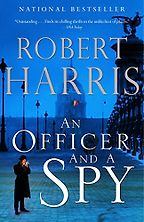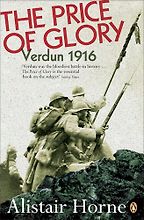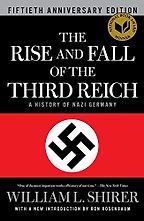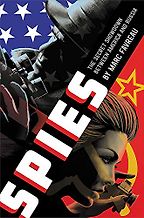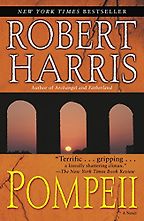How did you choose these history books?
All these books have been books that I’ve read over the last year. They’re pretty general and I feel like they cover a good (or at least semi-good) range of subjects across the 19th and 20th centuries. They are Eurocentric, mainly because that is the part of history I’m most interested in. Even though I’m also interested in more specific topics, I think the books I’ve chosen are the best for a wider audience and reading for teenagers.
Do you think there’s a good range of history books available for teenagers?
There is a good range, but they are pretty hard to find, because there are a lot of books that are focused on sources, facts and analysis. I feel what makes a history book appeal to a teenager is if it’s both easy reading and interesting. I guess the books I’ve chosen today are a mix, but more storytelling versus facts. If it’s just facts and sources, it overwhelms you and doesn’t help you with the story of history.
What do you mean by sources? Are you talking about primary sources?
I’m not sure. In exams, it seems to be more about facts and footnotes. Some footnotes are useful and help build on information, but sometimes I feel it’s over the top. It’s more about proving an opinion and showing something rather than telling the story of what happened.
Which book shall we start with?
I think we’ll start with my favourite book on this list, and that’s Robert Harris, An Officer and A Spy. It’s a retelling of the story of the Dreyfus Affair. It’s fiction, but it’s based on the actual history of the story, and it’s got facts, references to the real ambassadors, generals and diplomats who took part.
It tells the story of the Dreyfus Affair from the viewpoint of Georges Picquart, who was the man who investigated it, who was at the time part of the French intelligence service. So the story follows him and his uncovering of the Dreyfus Affair and how people in high places in the French army and government had been actively working against Dreyfus, to protect the honour of the French army, even after the truth came out that he was in fact innocent.
For anyone who hasn’t heard of it, can you explain what the Dreyfus Affair was?
The Dreyfus Affair was a series of events from the 1890s to roughly 1906, where a Jewish officer in the French army, Alfred Dreyfus, was accused of leaking military secrets, the designs of an artillery cannon, to the Germans. This was highly charged, due to the fact that only 20 years earlier, Germany had inflicted a humiliating defeat on the French in the Franco-Prussian War. (Well, Prussia had inflicted it).
Alfred Dreyfus was blamed for this, even though he had had no opportunity of getting the information on the cannon. He was probably blamed due to being Jewish. Then Colonel Picquart, as happens in the book, investigated the case and found that a French major, Ferdinand Esterhazy, had in fact been the real culprit in the leaking of the designs. Picquart was constantly blocked from revealing this information and there were many trials and eventually Esterhazy was brought to court and Dreyfus was released after years on a solitary island with horrible conditions.
How long did it take Dreyfus to clear his name?
He was convicted of treason in 1894, and declared innocent in about 1906, so the whole thing lasted 12 years.
What’s your next favourite history book a teenager might like?
My second favourite is Alistair Horn, The Price of Glory. It’s about the battle of Verdun in 1916 and covers the entire history. Out of the three Alistair Horne books I’ve read, it’s definitely the one I rank the highest. It’s incredibly interesting, almost taking Verdun, the battle, day by day. It’s very detailed and feels really human. It has stories about people delivering food while the fighting happens, about the air war, the political messages, generals being changed, and how little things cause massive outcomes in the end. For example, a Thuringian peasant was responsible for the taking of Fort Douaumont, the biggest fort in the entirety of the Verdun complex. The French were not defending it and he just crawled through a window. Later, two German companies turned up and took Fort Douaumont without a shot.
The book also shows how incredibly close things were. If it had not been snowing three days before, and weather conditions had permitted an attack on the day originally planned, Verdun would have almost certainly fallen. It was only due to the bravery of certain French soldiers in the face of a huge overwhelming force that Verdun managed to be held until sufficient reinforcements could bolster the defences.
Taking a step back, Verdun was one of the worst battles of World War One. The British always talk about the Somme, but…
Yes, for the British it was the Somme and Passchendaele, but for the French and the Germans, Verdun is definitely portrayed in national history as the singular most bloody meat grinder in the entire war. They share this collective memory of World War I. It bled Germany dry. The German army never again had the same fighting capabilities. The French just view it as a matter of national pride, how they defended France till the end, how every bit of soil was sacred.
How bad were the casualties at Verdun?
The Germans lost about 350,000; France also had similar numbers, maybe a bit more.
Okay, what’s the next book for teenage historians you’re recommending?
The next book is probably the most famous of the ones I’ve chosen. It’s The Rise and Fall of the Third Reich by William L. Shirer. It’s just a very good history of the Third Reich. It’s helped me a lot to understand what the Nazis did in day-to-day life in Germany, and the German public’s opinion of the war. It also gives you really, really in-depth knowledge of the war as it’s happening. I think that’s why it’s so famous. I wouldn’t rank it as highly as the other two books because it doesn’t have the same storytelling potential. But I still find it incredibly interesting on day-to-day events, from an American guy in the middle of the German Reich.
William Shirer was a journalist in Berlin, is that right?
Yes. He was kicked out eventually. But I think he was there from 1933 to 1941, basically on the inside.
What makes the book really good is that it’s also about the buildup of Germany before World War Two. That’s helped me in my history course as well. It shows how the Nazis controlled Germany.
There’s a lot on the background of Adolf Hitler and his family that I didn’t know.
That’s also really interesting, explaining the formation of the Nazi Party, and how it came to be. The stories of Hitler, Himmler, Göring: how those Nazi high commanders basically came from relatively normal lives—Himmler was a chicken farmer—and turned into this party that caused so much destruction.
Let’s talk about your fourth book, Spies by Marc Favreau.
This is about the Cold War and the intelligence war between NATO, focusing on the US, and the Soviet Union. It’s got lots of interesting stories and facts about things that went on, like the Americans building some sort of bugging device on an underground Soviet communications cable in Berlin. Even though the CIA thought it was this incredible achievement, apparently the Soviets had already known about it for seven months and they just fed fake information through it.
The book also focuses on smaller stories, like a British spy defecting to North Korea, and eventually to the Soviets. It’s got stories from every corner of the game or battle that happened in the backrooms of the USSR and NATO.
I think this book is actually aimed at teenagers or young adults. I’m not sure the other books you’ve chosen are.
Yes, it’s very much telling a story. It’s a nonfiction narrative. It goes through all the way from the early Cold War—the original breakdown in relations and how they were already spying on each other—to the development of technology through the years, till it got to a point where you can just have a single bug on your shoulder. The spying technology went from a giant computer in a room to what could be stored in a briefcase.
The last history book you’re recommending for teenagers is another work of historical fiction. You were considering Mary Renault’s novel about Alexander the Great, but in the end, you chose to go with another Robert Harris book, Pompeii.
Yes, I feel Robert Harris is just really good at telling a story and making it thrilling. The plot really engages you. This is true with his other books as well, like Fatherland and Archangel, even though they’re more alt-history rather than the two that I’ve chosen, which are more based on history. Pompeii is about the eruption of Vesuvius and an aqueduct engineer who finds out about it through the sulphur found in the water supplies of the Roman towns nearby. It’s this plot combined with a power-hungry millionaire, a former slave and his ambition to earn money. It’s got a great ending, and it’s filled with action. It keeps you entertained the entire way through.
And you learn a lot about the eruption of Vesuvius and how it unfolded.
Yes, you can see the individual towns and how it affected them, you hear about places. Even though the book is not a history, you can see how the average person would have viewed the eruption. Like news comes after three days from around the mountain that this town has just been cut off completely. It’s this very slow development of information that really helps you imagine yourself in the moment.
Doesn’t Pliny feature as well?
Pliny does feature and his death, sleeping. In the story, he goes out to try and save the library of a friend, who’s living along the shore. The library has incredibly-filled-with-information books, and Pliny feels he needs the Roman navy to come out and save it. So he went out in a ship to try to save it and he did, I think, but he died.
Sign up here for our newsletter featuring the best children’s
and young adult books, as recommended by authors, teachers, librarians and,
of course, kids.
Five Books aims to keep its book recommendations and interviews up to date. If you are the interviewee and would like to update your choice of books (or even just what you say about them) please email us at [email protected]
Five Books interviews are expensive to produce. If you've enjoyed this interview, please support us by donating a small amount.
